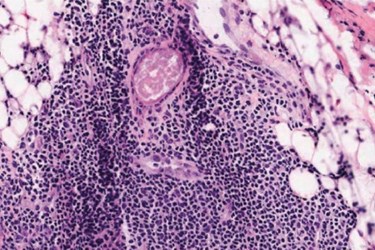New Test Uses Immune "Hotspots" To Tailor Breast Cancer Treatment

Using crime-lab statistical software, scientists have developed a breast cancer test that analyzes images of intense immune system activity. The technology could help physicians tailor treatment and improve chances of patient survival.
A team from the Institute of Cancer Research (ICR; London) led by Yinyin Yuan is studying ways that computational methods can be used to improve cancer diagnosis and treatment. The researchers used software developed by criminologists for tracking crime hotspots, and applied its statistical analysis to human immune response.
According to an ICR press release, the research found that images of spatially clustered immune cells around the cancerous cells provided a better indication of immune response than the number of immune cells inside the tumor.
“Our research is aiming to develop completely new ways of telling apart more and less aggressive cancers, based on how successful the immune system is in keeping tumors in check,” said Yuan in the press release.
A study published by the team in Modern Pathology looked at tumor samples from 245 women diagnosed with oestrogen receptor negative breast cancer, a notoriously difficult cancer to treat. Their research found that women with a high number of immune cell clusters lived 27 months longer before the cancer spread than women with a low number of clusters.
“Our study demonstrated the importance of quantifying not only the abundance of lymphocytes but also their spatial variation in the tumor specimen for which methods from other disciplines such as spatial statistics can be successfully applied,” the researchers wrote in the study.
Yuan’s team believes that computational methods and spatial statistics could be valuable in determining how aggressive treatment should be for individual patients.
“The interaction between the immune system and cancer is extraordinarily complex, and something we are only just beginning to understand. But just as there are high hopes for immunotherapy as a future cancer treatment, we also believe that this new way of measuring immune reaction could be used to tailor treatment more effectively to individual patients,” said Paul Workman, chief executive of ICR, said in the press release.
The study was funded by the U.K.’s Engineering and Physical Sciences Research Council (EPSRC), the Wellcome Trust, and the ICR.
“This study demonstrates the importance of engineering, physical sciences, and mathematical sciences which contribute to our understanding of cancer, its progression and treatment,” said Phillip Nelson, chief executive of EPSRC.
The CDC estimates that over 222,000 cases of breast cancer are diagnosed each year in the United States, and despite innovations in treatment, breast cancer remains the country’s second most common cause of cancer death among women.
Image credit: The Institute of Cancer Research
